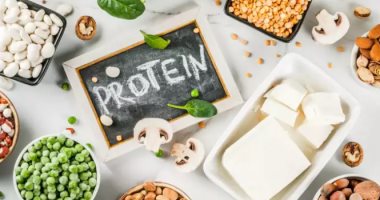Protein is one of the most important essential nutrients in the body, but it is important to understand the amount you need every day, and calculate the appropriate amount of protein that you need daily depends on several factors such as: genetic factors, bowel health, body formation goals, level of physical activity, and diet According to “Business Insider,” there is therefore no one strategy that applies to everyone.
How much protein should you consume each day?
Each person’s daily protein requirement is different, but in general, the average protein requirement is 56 grammes for men and 46 grammes for women (or 0. 36 grammes of protein per 500 grammes of body weight) This is sufficient, but it could not be for certain people who want to build or retain their muscles or lose weight.
For instance, current research suggests that consuming 0.
The ideal protein intake for people trying to gain more muscle mass or lose weight is 7 grammes of protein per 500 grammes of body weight.
According to this, a person who weighs 90 kg needs 140 grammes of protein per day. To gain muscle, you’ll need to combine a system of strength training with an increase in protein.
Weightlifting and resistance training fall under this category.
Additionally, a protein-rich diet combined with a strength training programme can help people reduce fat while developing muscle (which is known as the reinforcement).
Eggs, salmon, black beans, low-fat dairy products, and almonds are healthy protein sources that may aid in weight loss. If you are merely trying to lose weight, protein-rich diets can still be helpful to you because eating more protein helps to preserve muscle mass and manage your appetite.
advantages of consuming protein
Since the body cannot manufacture enough protein on its own, humans must rely on getting enough of it from their diet. Protein is essential for the body’s daily operations.
In addition to sustaining muscles, protein is crucial for healing tissues, immune system health, enzyme manufacturing, and energy.
A balanced diet that includes fat-free meat, fish, dairy, eggs, nuts, seeds, and whole grains guarantees that the body will absorb the right amount of protein.
What is the recommended daily protein intake for developing lean muscle?

